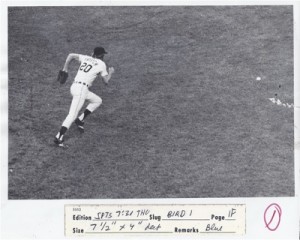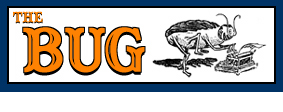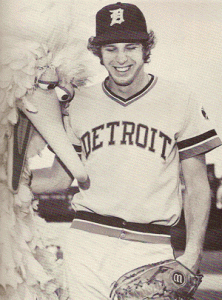 Yesterday would have been the 57th birthday of my favorite baseball player of all-time, Mark Fidrych. It was declared “Bird Day!” by fellow writer, friend, and Fidrych follower Dan Epstein. Sports Illustrated photographer Joe McNally wrote a wonderful reminiscence about the Bird which brought tears to my eyes. I wish thinking about my favorite ballplayer didn’t do that as often as it does, but so it goes.
Yesterday would have been the 57th birthday of my favorite baseball player of all-time, Mark Fidrych. It was declared “Bird Day!” by fellow writer, friend, and Fidrych follower Dan Epstein. Sports Illustrated photographer Joe McNally wrote a wonderful reminiscence about the Bird which brought tears to my eyes. I wish thinking about my favorite ballplayer didn’t do that as often as it does, but so it goes.
Unfortunately, I haven’t written much of anything about Fidrych after he died a tragic and terrifying death at the hands of his beloved truck, back in 2009. As Dan said about writing about the Bird, “it should have been as easy as falling off a dugout bench.” But it’s not.
Maybe this is because, despite his easy going ways, despite all that you could write about–like Mark’s talking to the ball, his meteoric rise and equally stunning fall–Mark Fidrych turns out to be a more complex character than any baseball player I’ve ever followed in my 35 years of watching this maddening sport. Fidrych, like most birds, is hard to catch.
For a kid still reeling from the effects of my parents’ divorce in 1975, and being a scrawny, unathletic doofus, Mark Fidrych was a revelation. Baseball was a revelation. I came from a family that didn’t follow sports, so it must’ve seemed bizarre to my folks that I suddenly went crazy for the nation’s pastime.
What I was crazy for was Mark Fidrych. Truly, he looked like my favorite character/stuffed animal, Sesame Street’s Big Bird (it helped that he posed with Big Bird often.) We all know how he spoke to the ball, leapt over the chalk lines, waved at his fellow players whenever they made a great play. This was liberating–it was human kindness and child-like joy on the baseball diamond, and it made me feel as if people who acted like Fidrych were embraced by society. Look at him here, yakking away after the June 28, 1976 game that turned me into a baseball fan:
The video cannot be shown at the moment. Please try again later.
He’s totally honest: “Everything’s new to me!” Well, everything was new to me as well. Mark and I are making this journey into baseball together it seemed.
This is what Fidrych did for this eight-year-old in 1976: he made me realize that the inevitable move toward adulthood–this world upended, of parents separating, of Gerald Ford and Jimmy Carter, and Jaws and Taxi Driver (neither of which I saw, but which loomed like shadows over my cinematic consciousness)–could be fun and joyous and even silly, just as it required hard work.
I felt like I was growing up fast that summer, my parents’ divorce barely a year old, and my trying to understand my mother’s profound depression and my Dad’s hippie existence (which included not standing at the “Star-Spangled Banner” at a Tigers game), which was so radically different than the other fathers in conservative Mt. Pleasant, Michigan. So when Fidrych revealed that even in professional baseball you could talk to inanimate objects, as I did with my Big Bird doll and he did with his baseballs, that blew my mind. It made me feel alive, that I could be myself and there was a place in the world for me. Sometimes, people like Mark Fidrych can accomplish those things that your parents cannot.
I’ve always bristled at the notion that baseball is a child’s game. Baseball is not a child’s game. It is a game that adults play, but that children learn in their quest to understand the mysteries of adulthood. Tag, hide and seek, cops and robbers or cowboys and indians–those are children’s games, bereft of all but the most simple rules. When we play baseball as children, we are trying to learn to become teammates, to understand the complexities of a sport whose rulebook runs into the hundreds of pages. We begin to embrace tools, play within boundaries, and begin a relationship with complex numbers. Children’s games are abandoned to childhood. Baseball carries us into adulthood.
As I look back, I realize that I never thought of Fidrych as a pied piper, or dream of him as a playground buddy. I thought of him as an adult. Mark Fidrych showed me the promise of adulthood, that being giddy and happy and, yes, goofy as all hell could in fact be rewarded with success. Burly, manly men celebrated Mark just as I did, treated him with respect. Baseball and manhood didn’t have so fucking rigid and macho, didn’t have to be so Pete Rose and George Brett. Being an adult could mean being like Mark Fidrych. To this day, I thank him for this gift.
Yesterday, feeding my blues, I read the old Rolling Stone with Fidrych on the cover and skimmed No Big Deal, the rushed biography/Altmanesque interview by noted poet and Paris Review editor Tom Clark. I recalled as a kid being really disappointed by the book, in part because it’s so weird and loosey-goosey and it didn’t really satisfy this kid’s longing for a meaty story of his favorite player. Honestly, I think there was some significant disappointment that he did not, in fact, live on Sesame Street.
But the stories also freaked me out a bit. Both show Fidrych as a humble dude, a kid who loved to drink canned beer, play baseball, and, according to Rolling Stone, have sex with cute girls, once on the pitcher’s mound. You can imagine Fidrych as a great guy to go out partying with, but who wouldn’t have been called a party animal, wouldn’t be in the Wade Boggs/Steve Garvey sex-addict camp. He was just having fun.
But like most heroes, I wanted him to be exactly as I imagined him, and that didn’t include fucking on the pitcher’s mound. It didn’t include the hazy, bizarre way the interview in No Big Deal was constructed, almost without direction, haphazard, all over the place. Was the guy stoned? Plus, he got mad in spots, said some stupid shit, and worst of all, claimed that he never spoke to his baseball, but was only giving himself a pep talk. Damn.
Despite this, I still adored the Bird, and eagerly awaited 1977. Sadly, the fun wouldn’t last. Disappointment, as it turns out, was also going to be the theme of the career of Mark Fidrych, in many profound ways.
I couldn’t know this at the time, but if there were stat-heads back then, they knew that there could be virtually no repeat of Fidrych’s 1976 season. The numbers are there, most of them memorized by this crazed fan: 19-9 won-loss record, 2.34 ERA, 97 K, 24 complete games. Rookie of the Year, runner-up to the Cy Young Award. Now, those numbers might have been approached if fate hadn’t intervened. Set aside the fact that pitchers with such a low-strikeout rate rarely, if ever, become superstars, Fidrych could’ve had a brilliant career: middle relief, innings eater, hell, maybe a closer, I don’t know. Instead, he twisted his ankle leaping over a fence, and then blew out his arm later.
And with that, he was done. Finished. Yes, it took five seasons (in which he played but few games.) I didn’t get to see him pitch at Tiger Stadium until 1980, his last year, in the second contest (I think) of a double-header when the Tigers retired Al Kaline’s number. Totally devastating. The Bird got beaten soundly, and the magic was gone.
This added another layer to my hardening exoskeleton: divorce, school, politics, the malaise of high school–disappointment would season many of the years that followed Fidrych’s defeat. As time went on, I would glance at the memorabilia, pausing to read at that old Rolling Stone or to roll my eyes at his biography. I’d heard the stories of his retirement to rural Massachusetts, his being a rock or pig farmer, something you could make a light joke of, but something that seemed strangely honest, too. Fidrych a gentleman farmer, living a zen-like life out in the sticks. Perfect.
Obviously, it’s more complex than that. I remember reading how pissy he could get because no one hired him to be in advertisements. He married, had a kid, and worked his ass off. He was still a good guy, but still kind of a mystery.
In 2008, on my book tour, I was in Cooperstown at a friendly baseball card shop, and found Fidrych’s rookie card. I had one already, in a little frame on a shelf of icons back home. I bought this one for fifty cents I think, and stuck it in my wallet for good luck on the trip. Maybe I kept it there because I needed something to keep my spirits afloat as my Dad was slowly succumbing to lung cancer many hundreds of miles away in Raleigh, North Carolina. A few weeks later my brother and I would be living with Dad, caring for him until he finally died. Again, there was Fidrych, unknowingly helping me out during a crisis.
Here is a strange and mystical moment that I cannot explain: driving through the mountainous cloud-country of West Virginia, in a U-haul truck with my Dad’s ashes next to me, despondent beyond belief, I was listening to an AM station playing rock classics. The DJ had a guy on the line, making a request. “How you doing?” the DJ asked. “Last time you were in rough shape.” It was true. This caller had lost his job and his wife, and said he had “his big toe on the trigger” last time he called, but now he was in AA, working, and feeling good. “No woman yet, but I’ve got prospects.” And he wanted to hear the song that brought him back from the dead. The DJ said, “you got it.”
The video cannot be shown at the moment. Please try again later.
“Itchycoo Park” by the Small Faces. That song really hit me, especially the lines “it’s all too beautiful” because I was driving through the clouds, through the driving rain, my poor brother wrestling with Dad’s old Nissan truck on the wet roads behind me, and myself doing the same with a U-Haul truck and sort-of not caring at the moment if I drove it off the side of the mountain. But I was filled momentarily with a feeling of, well, of overwhelming love. For Dad, for the song, for the mountains and the fog and the slippery roads, for everything. For the first time since he’d died, only a few days earlier, I thought life was beautiful in spite of all this fucking hell.
Now we cut to a few months later, eight months later, and I’m online and there’s the news: Mark Fidrych is dead. Mark Fidrych? I had to stare at the tiny link on the New York Times’ electronic front page. Dead.
Later I would discover the awful, awful truth of his death, that he had been working on his giant truck, supposedly the monster he bought with his bonus or something from his magical season. It was a reflection of both his New England sensibility and his goofball nature: he used his money to buy a truck that would help keep him employed, but Jesus, Mark, a truck? Yep. Well, he was under the truck, the engine was on, his shirt got tangled up in a shaft, and he was choked to death.
And now Mark Fidrych was dead. And I was so sick of good people dying. My Dad, a good friend Mike (who passed away suddenly the November before), and now the Bird. What the fuck? I just wanted to drive and not think, drive and listen to music, drive, drive, drive.
Now here’s the mystical-shit: as I hopped in the car to run an errand (so I told my wife) and take my mind off the news (which, I’m squeamish to admit, caused me to break down in near-hysterical tears), you know what happened: the Small Faces “Itchycoo Park” came on the radio. I listened and was calmed. I don’t know exactly what the Small Faces taught me at that moment, except that the lines “it’s all too beautiful” swirled around in my head and left me in peace.
I ran my errand, came home, and sat with all my Fidrych memorabilia, sad and, later, drunk. Of course, I collected all the obituaries–oddly enough, the next day I had a flight to Virginia with a layover in Detroit, and access to all the papers from the city where Fidrych played ball. I’ve written a number of obituaries for ballplayers and others–from Ernie Harwell, to Terry Blue, to Ted Williams. Perhaps I have a talent for that melancholy trade.
So why was Fidrych so hard? Perhaps I am confused as to his meaning. Perhaps he is too close, while being so very far away. We can look at him as a product of the time, while at the same time he was a product of no time, but totally unique. I know he was someone I elevated, a man who would, had I met him, surely disappointed me, because I made him into so much. Ted Williams, Alan Trammell, Kirk Gibson–I don’t have any illusions about these guys, other than the illusion that every time they came to bat I wanted them to smack the ball, and smack it hard. But they didn’t inform my life outside the game (at least not much.)
Like a book, or a movie, or a song that reveals itself in strange and trying moments in the course of your life, Mark Fidrych was present. Fidrych gave me a love for a sport that has lasted almost forty years, connected me with people I love, and he is the engine of my often obsessive nostalgia for that time period. At times I think of how he played his game and wish that I could be that joyous. He could not know that he helped out a child of divorce, or an adult whose parent is dying. He couldn’t know that he would teach me lessons in failure and redemption. Obviously, he could not know that his own death would come so soon after my Dad’s, and teach me to endure pain. But like a book, or poem, or painting that you love but cannot quite understand, the complexities of Mark Fidrych, the Mark Fidrych of my life, are profound.
Mark Fidrych was not my Dad, he was not my best friend. The reality is that I did not know him, not at all. What I know is this: Mark “The Bird” Fidrych is a man who has made me more happy and more sad than any baseball player or celebrity, hell, more than anyone outside my friends and family, the people I actually know and care about. He remains a great mystery in this messy world, and a gift from the same. And I miss him, even as he was a stranger. Do we ever completely understand the people that we love?
But why the tears there?
I’ll tell you why–
It’s all too beautiful…

